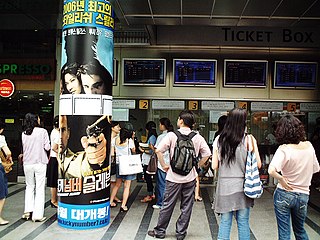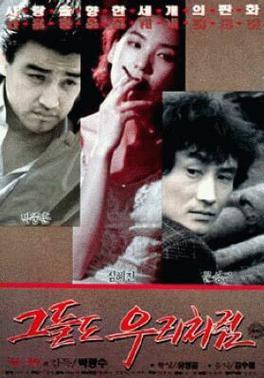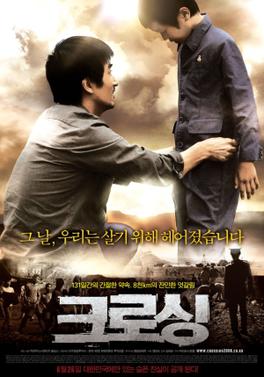Related Research Articles

Im Kwon-taek is one of South Korea's most renowned film directors. In an active and prolific career, his films have won many domestic and international film festival awards, as well as considerable box-office success, and helped bring international attention to the Korean film industry. As of spring 2015, he has directed 102 films.

The term "Cinema of Korea" encompasses the motion picture industries of North and South Korea. As with all aspects of Korean life during the past century, the film industry has often been at the mercy of political events, from the late Joseon dynasty to the Korean War to domestic governmental interference. While both countries have relatively robust film industries today, only South Korean films have achieved wide international acclaim. North Korean films tend to portray their communist or revolutionary themes.
Park Kwang-su is a South Korean filmmaker. He was born in Sokcho, Gangwon Province and grew up in Busan. Park joined the Yallasung Film Group as a student of Fine Arts at Seoul National University. Upon graduation, he founded and led the Seoul Film Group which was dedicated to renewing Korean film culture and closely tied to the student protest movement. The Seoul Film Group was a significant part of the independent film movement and a strong voice speaking out against the military dictatorship. Park studied film at the ESEC film school in Paris, then returned to Korea to work as an assistant director to Lee Chang-Ho. He made his own first feature in 1988, and in 1993 became the first Korean filmmaker to found his own production company.

East Asian cinema is cinema produced in East Asia or by people from this region. It is part of Asian cinema, which in turn is part of world cinema.

South Korean films have been heavily influenced by such events and forces as the Korea under Japanese rule, the Korean War, government censorship, the business sector, globalization, and the democratization of South Korea.

Ju Ji-hoon is a South Korean actor and model. His first leading role was in the Princess Hours (2006). His other notable works include Lucifer (2007), Antique (2008), Mask (2015), Along with the Gods: The Two Worlds (2017), Along with the Gods: The Last 49 Days (2018), The Spy Gone North (2018), Dark Figure of Crime (2018), Kingdom (2019–2020) and Jirisan (2021).

Choi Dong-hoon is a South Korean film director and screenwriter. He ranks as one of the most consistently successful directors working in contemporary Korean cinema, with all first five of his films becoming commercial hits -- The Big Swindle attracted 2.12 million viewers, Tazza: The High Rollers at 6.84 million, Jeon Woo-chi: The Taoist Wizard at 6.13 million, The Thieves at 12.9 million, and Assassination at 12.7 million.

Chilsu and Mansu is a 1988 South Korean film, and noted director Park Kwang-su's debut film. Though not a box-office hit, the film is remembered as a major step towards freedom of expression in South Korean cinema.

Black Republic is a 1990 South Korean film directed by Park Kwang-su.

Crossing is a 2008 South Korean film directed by Kim Tae-kyun. It was selected as South Korea's submission to the 81st Academy Awards for Best Foreign Language Film. The film follows the journey of a North Korean man as he illegally leaves the country to find medicine for his sick wife, portraying the many hardships of the average North Korean citizen. The film had 907,255 admissions in South Korea.

City of Damnation is a 2009 South Korean action comedy film directed by Kim Dong-won and is a remake of the 2002 Hong Kong film Infernal Affairs.

Lee Kwang-soo is a South Korean actor, entertainer, and model. He made his acting debut in the sitcom Here He Comes (2008) and received further recognition for his roles in medical melodrama It's Okay, That's Love (2014), neo-noir film Confession (2014), black comedy film Collective Invention (2015), sitcom The Sound of Your Heart (2016), and drama Live (2018), and human comedy film Inseparable Bros (2019).

Kim Young-kwang is a South Korean actor and model. Kim began his career as a model and has modeled for designers such as Alexander McQueen, Vivienne Westwood and Etro. In 2008, he was the first Asian model to model at Dior Homme's show. As an actor, Kim has starred in the films Runway Cop (2012), Hot Young Bloods (2014), On Your Wedding Day (2018) and The Soul-Mate (2018), as well as the television dramas Pinocchio (2014), D-Day (2015), Sweet Stranger and Me (2016), The Guardians (2017), and The Secret Life of My Secretary (2019).
Kwang-hoon is a Korean male given name.
Kim Kwang-sik is a South Korean film director and screenwriter. He directed the romantic comedy My Dear Desperado (2010) and the crime thriller Tabloid Truth (2014).

V.I.P. is a 2017 South Korean crime-action thriller film directed by Park Hoon-jung and starring Jang Dong-gun, Kim Myung-min, Park Hee-soon and Lee Jong-suk. In the film, officers from South Korea, North Korea and Interpol chase after a serial killer suspect.

Lee Kwang-kuk is a South Korean film director and screenwriter. An acclaimed indie filmmaker who was a former assistant director to Hong Sang-soo, Lee debuted with Romance Joe (2011), and has since directed another two features A Matter of Interpretation (2014) and A Tiger in Winter (2017).

Find Me in Your Memory is a 2020 South Korean television series starring Kim Dong-wook and Moon Ga-young. It aired on MBC TV from March 18 to May 13, 2020.

Mission: Possible is a 2021 South Korean action comedy film written and directed by Kim Hyung-joo. Based on the Mission: Impossible series by Bruce Geller, the film stars Lee Sun-bin and Kim Young-kwang in the lead roles. The story follows the antics of secret agent Da-hee and an ex-special agent-turned-private detective Soo-han. The film was released in South Korea on February 17, 2021.
References
- ↑ "Lee Kwang-hoon (이광훈)".
- ↑ Leong, Anthony C. Y. (2003). Korean cinema: the new Hong Kong: a guidebook for the latest Korean new wave. Trafford Publishing. p. 139. ISBN 978-1-55395-461-3.
- ↑ Gateward, Frances K. (2007). Seoul searching: culture and identity in contemporary Korean cinema. SUNY Press. p. 55. ISBN 978-0-7914-7225-5.
- ↑ Han, Sunhee (7 August 2008). "S. Korea picks 'Crossing' for Oscars". Variety . Retrieved 25 January 2010.